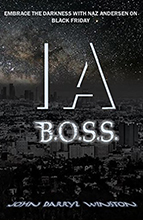
I haven’t read that much YA fantasy, but in my limited experience of it, I have really come to resent the term “dystopia” and the almost complete absence of hope and downright inhuman cruelty that goes with it. I read The Hunger Games, the entire trilogy, with a morbid fascination but not much pleasure at all. I came away feeling slightly dirty, and deeply concerned that this sort of thing is now a recipe for selling millions of copies. Because, what does that say about us?
I am very happy to report that John Darryl Winston’s IA series does not follow that formula. The world it is set in is not dystopia, but a slightly altered alternative reality. It’s not a real place, but it’s still a world you recognise. Winston obviously has an imagination capable of creating new worlds, but he’s not showing off about it; there’s a subtlety in the “fantasy” element of the series that I appreciate. Literature should equally provide a reprieve from everyday life and an opportunity to understand it from a slightly different point of view, and it’s a hard balance to strike. And that, I think, is the greatest challenge of the fantasy genre: to create new worlds and new realities where parallels can still be drawn to the reality the reader can relate to and the issues that concern them. Even more so when it comes to YA fantasy, which has the added responsibility of addressing a very suggestible and potentially vulnerable group of people; people who are still open to learning, and being taught, who still look to adults for answers – even as they pretend to dismiss us. It’s a privilege, I think, that shouldn’t be taken lightly: there is potential here for teaching, for motivating, for empowering. And there is also potential for embittering, for disheartening, for creating a skewed, sinister version of reality and sending young people straight into it, unarmed. Rhetorical question: what exactly do The Hunger Games and their dystopian friends teach us about life?
IA: B.O.S.S. (just like IA: Initiate before it) does have things to teach, good things, and that is perhaps due, in part, to Winston’s background as a teacher to young people himself. To me, the IA series is about personal strength and growth, overcoming obstacles both external and internal and becoming the best version of yourself that you can be. It’s about a boy growing up in an underprivileged neighbourhood, finding his place in the world without losing himself. It’s about peer pressure and bullying and the value of friendship and the unexpected allies you come across, if you open yourself up to them. Naz’s personal strengths may manifest as supernatural powers imbued by his mysterious genius dad, and the opposition may not come in the form of straight-up bullies but the darkly menacing IA gang, but these storytelling elements serve to enhance the real-life parallels and messages rather than distracting from them. And it is all delivered with a sensitivity and intelligence that is sorely absent from much that passes as literature these days.
I wouldn’t describe IA: B.O.S.S. as a page-turner, and that’s a compliment. That’s another concept that I’ve taken against recently: why we think that compulsively reading a book is a good thing. To me, books should be savoured – and yes, there should be enough tension or suspense to make you want to turn the page, but not at the cost of the page you’re actually on. It’s a symptom of the way we live these days, where we’re always skipping ahead, where everything we do is a stepping stone to the next thing, where a moment has no value except for what it might bring. IA: B.O.S.S. doesn’t lack tension or suspense; it raises questions and sends you onwards, looking for answers. But it does so at a comfortable pace that allows you the space and time for reflection and contemplation, for taking in what you’ve read and appreciating it. And it can afford to do that, because it has substance, rather than just plot and fancy dystopian scenery and the debatable value of shock.
The IA series may not sell millions of copies although, if the world made sense, it would – and I really hope it does. But those of us who’ve read it are the lucky ones, the privileged ones; lucky enough to have come across these books, and privileged to see the world through the eyes of an author with a genuine voice, a genuine heart and a genuine message to impart.
So read these books. Turn the pages slowly. Enjoy.
As for me, I may be skipping ahead, but I’m already looking forward to the final part of the series. But patiently.
***
Get your copy of IA: B.O.S.S. here.
What a lovely reminder on the purpose and importance of books – thank you
LikeLiked by 1 person
Thank you Rachel!
LikeLike
Still blown away by this never-to-be-topped review.
LikeLike